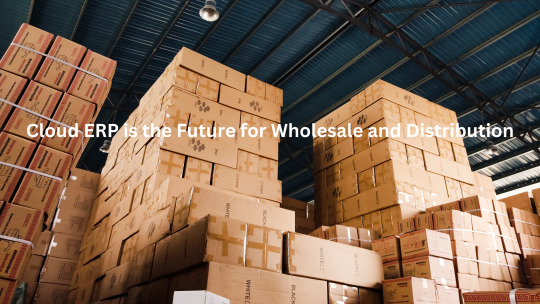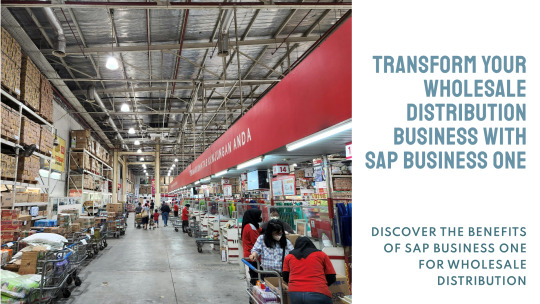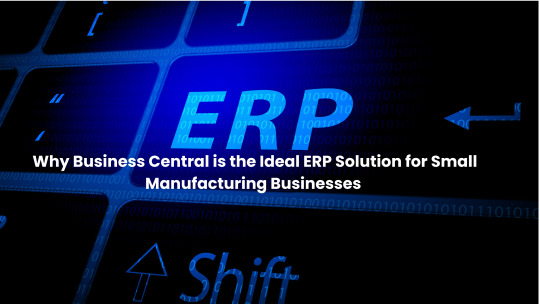#erp software for WholeSale And Distribution
Explore tagged Tumblr posts
Text
How ERP Helps Wholesale and Distribution Businesses Scale Efficiently

In today’s fast-paced business environment, wholesale and distribution businesses face numerous operational challenges to remain competitive and meet customer demands. With increasing market complexities, businesses are continuously seeking ways to optimize their operations, reduce costs, and scale efficiently. One of the most effective tools for achieving these goals is ERP software for wholesale and distribution. By integrating various business processes into a single platform, ERP system enable businesses to streamline operations, improve decision-making, and enhance productivity. Why ERP is Essential for Scaling Wholesale and Distribution Businesses For deep understanding read our Blog
#erp software for WholeSale And Distribution industry#Best erp for WholeSale And Distribution#erp software for WholeSale And Distribution#Leading erp for WholeSale And Distribution#Best Software for WholeSale And Distribution#ERP Services for WholeSale And Distribution#ERP solutions for WholeSale And Distribution#ERP partner for WholeSale And Distribution#Trusted ERP Solutions for WholeSale And Distribution#Best ERP software for WholeSale And Distribution#Best ERP System for WholeSale And Distribution#Best ERP Provider For WholeSale And Distribution#erp software WholeSale And Distribution#erpWholeSale And Distribution software#WholeSale And Distribution erp software#Top erp software for WholeSale And Distribution#erp software WholeSale And Distribution company
0 notes
Text
Why Cloud ERP is the Future for Wholesale and Distribution

In the ever-evolving landscape of wholesale and distribution, businesses face challenges such as managing inventory, tracking orders, optimizing supply chains, and maintaining customer satisfaction. Traditional systems struggle to meet these demands, pushing companies to adopt more advanced solutions. Cloud ERP software solutions for businesses in India have emerged as a game-changer, revolutionizing how wholesale and distribution companies operate.
Scalability and Flexibility
One of the standout advantages of ERP software for wholesale distribution businesses in India is its scalability. As businesses grow, their operational needs change. Cloud ERP systems can easily adapt, whether it’s scaling up to handle more users or incorporating additional features to meet the expanding requirements of distribution networks. Unlike on-premises systems, cloud-based solutions offer flexibility, enabling businesses to access their data and tools from anywhere, at any time.
Enhanced Inventory Management
For wholesale and distribution businesses, efficient inventory management is crucial. Cloud ERP systems provide real-time inventory tracking, allowing businesses to monitor stock levels, manage reorders, and prevent overstocking or understocking. With ERP software for wholesale distribution businesses in Mumbai, companies can make data-driven decisions to optimize their inventory, reduce costs, and improve profitability.
Improved Collaboration and Communication
Wholesale and distribution operations often involve multiple stakeholders, from suppliers to logistics providers and customers. Cloud ERP systems centralize data, making it accessible to authorized users across departments. This seamless sharing of information fosters better collaboration, minimizes miscommunication, and ensures that everyone involved in the supply chain is on the same page.
Cost-Effectiveness
Implementing a cloud ERP system eliminates the need for expensive hardware, reducing upfront costs. Additionally, ERP solutions for wholesale distribution companies in India are subscription-based, allowing businesses to pay only for the features they use. This cost-effective model makes cloud ERP an attractive option for small and medium-sized enterprises looking to maximize their ROI without compromising functionality.
Advanced Analytics and Reporting
Cloud ERP systems are equipped with robust analytics tools that provide actionable insights into business operations. For wholesale and distribution businesses, these insights can highlight trends, identify inefficiencies, and forecast demand. This enables companies to stay ahead of market fluctuations and make proactive decisions that drive growth.
Enhanced Security and Compliance
With cyber threats becoming more sophisticated, data security is a top priority. Cloud ERP providers offer advanced security measures, such as encryption and regular updates, to protect sensitive business information. Furthermore, these systems often include compliance features to ensure businesses adhere to industry regulations, a critical aspect for wholesale and distribution companies operating in multiple regions.
Seamless Integration and Automation
Cloud ERP systems are designed to integrate with other business tools, such as CRM, accounting software, and e-commerce platforms. This integration streamlines processes, reduces manual tasks, and improves overall efficiency. Automation features further enhance productivity by handling repetitive tasks, allowing employees to focus on strategic initiatives.
Future-Ready Solutions
The wholesale and distribution industry is rapidly evolving, driven by digital transformation and changing customer expectations. Cloud ERP systems are future-ready, offering regular updates to incorporate the latest technologies, such as AI and machine learning. This ensures that businesses remain competitive and adaptable in an ever-changing market.
In conclusion, Cloud ERP software solutions for businesses in India are reshaping the wholesale and distribution sector by offering scalability, efficiency, and cost-effectiveness. Companies looking to thrive in 2025 and beyond should embrace ERP software for wholesale distribution businesses in Mumbai to streamline operations, enhance decision-making, and achieve sustainable growth. Contact Growthawk today to learn more about how cloud ERP can transform your wholesale and distribution business.
0 notes
Text

Want to transform your wholesale distribution business? 💼✨
#sap b1#sap erp#sap business one#erp for small business#cloud partner#sapbusinessone#erp software#cloud erp#clouderp#wholesale distributers
1 note
·
View note
Link
ALZERP is a leading Cloud ERP software in Saudi Arabia designed for wholesale, retail, and distribution businesses. Key features include:
Taxpayer Companies' Branches Information form:
Comprehensive branch management:
Broader ERP functionalities:
Simplifies branch data entry and management
Allows for company selection and detailed branch information input
Supports document upload for licenses and permits
Offers customizable report header options
Centralized list of all registered branches
Easy access to branch details and associated documents
Cloud-based accounting and inventory management
SAAS model for cost-effectiveness
Compliance with KSA regulations (ZATCA)
Optional modules like POS, order management, and purchase order systems
ALZERP positions itself as a complete business management solution, offering flexibility, scalability, and real-time insights for businesses operating in Saudi Arabia. It aims to streamline operations, enhance efficiency, and provide a competitive edge in the KSA market.
https://alzerp.com/kb/docs/branch-info/
#CloudERP Business Management Accounting Software Inventory ERP Wholesale Solutions RetailManagement EInvoicing ZATCACompliance ProfitAnalysi#best erp software in saudi arabia business software ksa cloud erp saudi cloud software saudi arabia distribution erp in saudi arabia erp clo
0 notes
Text
Maximizing Efficiency with Navision ERP Software
In today's competitive business environment, efficiency and integration are key. Navision ERP software provides comprehensive solutions that streamline operations across various industries. This article explores the benefits of Navision ERP software, the advantages of a POS retail ERP system, and the impact of ERP on wholesale distribution.
Understanding Navision ERP Software
Navision ERP software, also known as Microsoft Dynamics NAV, is a versatile and powerful tool. It integrates various business processes into a single platform. This ERP solution is designed to manage accounting, supply chain, and customer relationships seamlessly.
Key Benefits of Navision ERP Software
Comprehensive Integration: Navision ERP integrates financials, supply chain, and customer data into one system.
Scalability: As your business grows, Navision can easily scale to meet new demands.
User-Friendly Interface: The software features an intuitive interface, making it easy for employees to use.
The Importance of a POS Retail ERP System
For retail businesses, having an integrated POS retail ERP system is crucial. It ensures that point-of-sale transactions are seamlessly integrated with back-end processes.
Advantages of an Integrated POS Retail ERP System
Real-Time Inventory Management: Automatically update inventory levels with each sale, reducing the risk of stockouts.
Improved Customer Experience: Access customer data instantly to provide personalized service.
Streamlined Operations: Integrate sales data with accounting and inventory systems to streamline business operations.
Enhancing Wholesale Distribution with ERP
The wholesale distribution sector involves managing large inventories and complex supply chains. Implementing an ERP for wholesale distribution can greatly enhance efficiency and accuracy.
Benefits of ERP for Wholesale Distribution
Optimized Inventory Management: Maintain optimal stock levels and reduce excess inventory.
Supply Chain Integration: Streamline procurement, warehousing, and distribution processes.
Data-Driven Decisions: Use real-time data and analytics to make informed decisions.
Choosing the Right ERP Solution
Selecting the right ERP solution is critical for maximizing its benefits. Here are some tips to guide you in choosing the best ERP software for your business needs.
Assess Your Business Requirements
Identify specific business needs and objectives. Consider factors like the number of users, essential features, and budget. This assessment will help you narrow down your options and find a solution that aligns with your goals.
Evaluate Different ERP Providers
Research various ERP providers and their offerings. Look for providers with a strong reputation and extensive experience in your industry. Review client testimonials and case studies to gauge customer satisfaction.
Request Demos and Trials
Most ERP providers offer demos or trial versions of their software. Use these opportunities to assess usability and functionality. Involve key stakeholders in the evaluation process to ensure the solution meets their needs.
Implementing ERP: Best Practices
Successful implementation of an ERP system involves careful planning and execution. Follow these best practices for a smooth transition:
Define Clear Objectives
Clearly define your business objectives and how the ERP system will help achieve them. A clear vision will guide the implementation process and ensure alignment with your goals.
Engage Stakeholders
Involve key stakeholders from the start. Their input and support are crucial for a successful implementation. Regularly communicate progress and address any concerns they may have.
Plan for Change Management
Implementing an ERP system often requires changes in business processes and workflows. Prepare your team for these changes by providing adequate training and support. Encourage a culture of adaptability and continuous improvement.
Monitor and Optimize
Once the ERP system is implemented, continuously monitor its performance. Gather feedback from users and make necessary adjustments to optimize its use. Regularly update the system to ensure it remains aligned with your business needs.
The Future of ERP Systems in Business
The business landscape is constantly evolving. To stay competitive, businesses must embrace modern solutions like ERP systems. Implementing a robust ERP system can significantly enhance your operations, streamline processes, and improve customer satisfaction.
Embrace Technology for Growth
Investing in an ERP system is about more than just solving current challenges. It's about preparing for future growth. An ERP system provides the scalability needed to adapt to market changes and expand your business. By leveraging advanced features like real-time analytics and automated processes, businesses can make strategic decisions and drive growth.
Conclusion
Implementing Navision ERP software can greatly enhance business operations. Whether you're looking to integrate a POS retail ERP system or streamline your ERP for wholesale distribution, the right ERP solution is crucial. Follow best practices for implementation to ensure a smooth transition and maximize the benefits of your ERP system.
Embrace the future of business management with a robust ERP system and unlock your organization’s full potential.
0 notes
Text
Maximizing Efficiency with Navision ERP Software

In today's competitive business environment, efficiency and integration are key. Navision ERP software provides comprehensive solutions that streamline operations across various industries. This article explores the benefits of Navision ERP software, the advantages of a POS retail ERP system, and the impact of ERP on wholesale distribution.
Understanding Navision ERP Software
Navision ERP software, also known as Microsoft Dynamics NAV, is a versatile and powerful tool. It integrates various business processes into a single platform. This ERP solution is designed to manage accounting, supply chain, and customer relationships seamlessly.
Key Benefits of Navision ERP Software
Comprehensive Integration: Navision ERP integrates financials, supply chain, and customer data into one system.
Scalability: As your business grows, Navision can easily scale to meet new demands.
User-Friendly Interface: The software features an intuitive interface, making it easy for employees to use.
The Importance of a POS Retail ERP System
For retail businesses, having an integrated POS retail ERP system is crucial. It ensures that point-of-sale transactions are seamlessly integrated with back-end processes.
Advantages of an Integrated POS Retail ERP System
Real-Time Inventory Management: Automatically update inventory levels with each sale, reducing the risk of stockouts.
Improved Customer Experience: Access customer data instantly to provide personalized service.
Streamlined Operations: Integrate sales data with accounting and inventory systems to streamline business operations.
Enhancing Wholesale Distribution with ERP
The wholesale distribution sector involves managing large inventories and complex supply chains. Implementing an ERP for whol esale distribution can greatly enhance efficiency and accuracy.
Benefits of ERP for Wholesale Distribution
Optimized Inventory Management: Maintain optimal stock levels and reduce excess inventory.
Supply Chain Integration: Streamline procurement, warehousing, and distribution processes.
Data-Driven Decisions: Use real-time data and analytics to make informed decisions.
Choosing the Right ERP Solution
Selecting the right ERP solution is critical for maximizing its benefits. Here are some tips to guide you in choosing the best ERP software for your business needs.
Assess Your Business Requirements
Identify specific business needs and objectives. Consider factors like the number of users, essential features, and budget. This assessment will help you narrow down your options and find a solution that aligns with your goals.
Evaluate Different ERP Providers
Research various ERP providers and their offerings. Look for providers with a strong reputation and extensive experience in your industry. Review client testimonials and case studies to gauge customer satisfaction.
Request Demos and Trials
Most ERP providers offer demos or trial versions of their software. Use these opportunities to assess usability and functionality. Involve key stakeholders in the evaluation process to ensure the solution meets their needs.
Implementing ERP: Best Practices
Successful implementation of an ERP system involves careful planning and execution. Follow these best practices for a smooth transition:
Define Clear Objectives
Clearly define your business objectives and how the ERP system will help achieve them. A clear vision will guide the implementation process and ensure alignment with your goals.
Engage Stakeholders
Involve key stakeholders from the start. Their input and support are crucial for a successful implementation. Regularly communicate progress and address any concerns they may have.
Plan for Change Management
Implementing an ERP system often requires changes in business processes and workflows. Prepare your team for these changes by providing adequate training and support. Encourage a culture of adaptability and continuous improvement.
Monitor and Optimize
Once the ERP system is implemented, continuously monitor its performance. Gather feedback from users and make necessary adjustments to optimize its use. Regularly update the system to ensure it remains aligned with your business needs.
The Future of ERP Systems in Business
The business landscape is constantly evolving. To stay competitive, businesses must embrace modern solutions like ERP systems. Implementing a robust ERP system can significantly enhance your operations, streamline processes, and improve customer satisfaction.
Embrace Technology for Growth
Investing in an ERP system is about more than just solving current challenges. It's about preparing for future growth. An ERP system provides the scalability needed to adapt to market changes and expand your business. By leveraging advanced features like real-time analytics and automated processes, businesses can make strategic decisions and drive growth.
Conclusion
Implementing Navision ERP software can greatly enhance business operations. Whether you're looking to integrate a POS retail ERP system or streamline your ERP for wholesale distribution, the right ERP solution is crucial. Follow best practices for implementation to ensure a smooth transition and maximize the benefits of your ERP system.
Embrace the future of business management with a robust ERP system and unlock your organization’s full potential.
0 notes
Text

ERP For Wholesale Distribution
Integrate your wholesale and distribution business seamlessly using cloud-based Sage X3 ERP software for end-to-end solutions.
#greytrix middle east#erp software#sage erp#sage x3#wholesale trade industry#wholesale industry#wholesale distribution
0 notes
Text
Advantages of an ERP System If You've Never Used One.
Enterprise Resource Planning (ERP) structures are incorporated software program packages that allow groups to manipulate and automate their enterprise processes, consisting of accounting, human resources, inventory, delivery chain management, and consumer courting management, amongst others. If you`ve in no way used an ERP machine before, right here are a few benefits to consider:
Improved efficiency: ERP structures streamline and automate enterprise processes, lowering the effort and time required to carry out ordinary tasks. This can result in progressed productivity, quicker reaction times, and higher decision-making.
Increased accuracy: By integrating records from specific departments and structures, ERP structures assist to lessen mistakes and inconsistencies, making sure that statistics is correct and up-to-date.
Better visibility: ERP structures offer real-time records and reports, giving managers and bosses a clean view of the organization's operations and performance. This permits them to make knowledgeable selections and reply fast to converting conditions.
Enhanced collaboration: ERP structures offer a centralized platform for personnel to percentage statistics and collaborate on projects, growing communique and teamwork throughout departments and locations.
The best ERP software in Dubai offers a complete view of consumer interactions and history, permitting groups to higher apprehend and reply to consumer wishes and preferences.
0 notes
Text
Driving Business Success with Marg ERP Software Solutions in UAE
Marg ERP Ltd. stands as a leading provider of innovative software solutions tailored to meet the diverse needs of small and medium-sized enterprises (SMEs) and micro, small, and medium enterprises (MSMEs). Renowned for its expertise in Inventory, Accounting, and Digital Payment solutions, Marg ERP has established itself as the go-to choice for businesses seeking seamless operations across various industries.
What is Marg?
Marg ERP Ltd. is a pioneer in business software products, with a commanding presence in industries such as Pharma and FMCG, holding over 50% market share in India. Specializing in integrated business application software and apps, Marg empowers businesses of all sizes to streamline operations, enhance productivity, and embrace digital transformation. With a robust online and offline infrastructure, Marg ERP ensures that its solutions cater to the dynamic needs of businesses worldwide.
Industries We Serve
Marg ERP’s comprehensive solutions are designed to meet the unique demands of various industries. Here’s an overview of how Marg software supports businesses across key sectors:
Retail Solutions
Retailers in today’s fast-paced market require efficient tools to manage inventory, billing, and customer interactions. Marg ERP offers a range of retail-specific software to simplify operations and enhance customer satisfaction:
Pharmacy Management Software: Streamline medicine inventory, expiry tracking, and billing with pharmacy-focused solutions.
POS Software for Retail Stores: A reliable Point of Sale (POS) system to manage sales, payments, and customer data.
Supermarket Software: Optimize grocery and departmental store operations with advanced inventory and billing features.
Jewellery Management Software: Tailored solutions for tracking gold, silver, and diamond inventory, ensuring accuracy and transparency.
Restaurant POS System: Simplify order management, billing, and inventory for restaurants and food chains.
Garment Retail Software: Manage stock, sizes, and seasonal inventory with ease.
Salon & Spa Software: Enhance client scheduling, billing, and service management for beauty and wellness businesses.
Distribution Solutions
Efficient distribution is key to business growth. Marg ERP delivers feature-rich software for distributors across various sectors:
Pharma & Health Distribution Software: Simplify wholesale pharmaceutical operations with batch-wise inventory and GST billing.
FMCG Distribution Software: Enable seamless supply chain management and order processing.
Automobile Distribution Software: Manage spare parts inventory and streamline dealership operations.
Warehouse Management Software: Ensure accurate inventory tracking and warehouse organization.
Electronic Distribution Software: Monitor stock levels and manage vendor relations effectively.
Jewellery Distribution Software: Enhance supply chain efficiency for jewellery wholesalers.
Textile & Apparel Distribution Software: Manage fabric and apparel distribution with advanced features.
Mandi (Aadhat) Software: Streamline agricultural produce trading and billing.
Import/Export Management Software: Simplify international trade documentation and inventory tracking.
Manufacturing Solutions
Manufacturers require precision tools to manage production processes, inventory, and billing. Marg ERP’s manufacturing software caters to diverse industries:
Pharma/Health Manufacturing Software: Ensure compliance and manage production efficiently.
Food & Beverage Manufacturing Software: Track raw materials and streamline production workflows.
Ayurvedic Manufacturing Software: Manage inventory and regulatory requirements with ease.
Automobile Manufacturing Software: Enhance production tracking for auto components.
Textile Manufacturing Software: Optimize fabric production and inventory.
Electronics Manufacturing Software: Manage assembling and testing processes effectively.
ERP Software for Process Manufacturing: Handle batch-wise production and quality checks seamlessly.
ERP and Corporate Solutions
Marg ERP delivers cutting-edge enterprise solutions to enhance organizational efficiency and drive growth:
Retail Chain ERP Solutions: Centralized management for multi-location retail chains.
Supply Chain ERP Solutions: Optimize logistics and supply chain operations.
SFA (Sales Force Automation): Empower sales teams with tools for tracking and managing sales.
Pharma ERP Solutions: Advanced ERP features tailored to the pharmaceutical industry.
Corporate ERP Solutions: Comprehensive software for large-scale enterprises.
Key Features of Marg ERP Software
Cloud-Based ERP Software: Access your business data anytime, anywhere with secure cloud hosting.
Affordable Inventory Management Software: Ensure cost-effective inventory tracking and management.
Custom ERP Software for Businesses: Tailor-made solutions to meet specific industry needs.
CRM and ERP Solutions: Combine customer relationship management with enterprise resource planning for holistic business growth.
Best Accounting Software for SMEs: Simplify financial management with GST-compliant billing and reporting tools.
Benefits of Marg ERP for Small Businesses in UAE
Scalability: Marg’s solutions grow with your business, ensuring long-term usability.
Cost-Effectiveness: Affordable software packages designed for SMEs and startups.
Enhanced Productivity: Automate repetitive tasks to save time and resources.
Regulatory Compliance: GST and VAT-ready features ensure hassle-free compliance.
Real-Time Data Access: Make informed decisions with real-time analytics and reporting.
User-Friendly Interface: Easy-to-use design for quick adoption by employees.
Why Choose Marg ERP in UAE?
Marg ERP’s presence in Dubai and the wider UAE market underscores its commitment to delivering localized solutions that cater to regional business needs. Here’s why businesses in UAE prefer Marg ERP:
Local Support: On-ground assistance through the Dubai office for seamless implementation and troubleshooting.
Industry Expertise: Decades of experience catering to industries like Pharma, FMCG, and Retail.
Comprehensive Training: User-friendly training sessions to help businesses maximize the software’s potential.
Free Demos: Experience the software’s features with a free demo before making a commitment.
Customized Solutions: Tailored software packages to meet the unique requirements of UAE businesses.
Contact Us
Marg ERP Ltd. is ready to partner with you in driving business success. For more information, visit us at our Dubai office:
Address: Hearty Mart Overseas, 250 Ground Floor, Unique World Business Center, Al Karama, Dubai, UAE
Phone: +971 56 199 0296 Email: [email protected]
Experience the future of business automation with Marg ERP software solutions tailored for your success. Whether you’re a startup, SME, or a large enterprise, Marg ERP has the right tools to elevate your business operations. Request your free ERP software demo today!
0 notes
Text
Apparel Accounting Software: Simplify Your Fashion Business Finances
Apparel Accounting Software is a must-have solution for fashion businesses looking to streamline financial management. Tailored specifically for the apparel industry, this software helps manage invoicing, expenses, inventory, payroll, and order tracking all in one platform. It ensures accurate financial records, reduces manual errors, and improves overall operational efficiency.
Designed for manufacturers, retailers, and wholesalers, Apparel Accounting Software integrates seamlessly with inventory and sales systems, providing real-time financial insights. Track costs, manage budgets, and monitor profit margins to make smarter business decisions.
0 notes
Text
Why Business Central is the Ideal ERP Solution for Small Manufacturing Businesses

In the ever-evolving landscape of wholesale and distribution, businesses face increasing pressure to streamline operations, improve customer service, and reduce costs. Cloud ERP (Enterprise Resource Planning) systems are emerging as the ultimate solution to these challenges, providing a transformative approach to managing complex supply chains and distribution networks. With robust capabilities and unparalleled scalability, Cloud ERP software solutions for businesses in India are leading the way in revolutionizing the wholesale and distribution industry.
The Challenges of Wholesale and Distribution
Wholesale and distribution businesses operate in highly competitive markets. They often manage extensive inventories, diverse product lines, and intricate supply chains that span across multiple locations. Traditional systems, such as on-premises ERP or disconnected software tools, struggle to keep up with the demands of real-time data management, operational visibility, and seamless coordination among departments.
These challenges are further amplified for large enterprises that require robust solutions to handle high transaction volumes and global operations. For such businesses, efficiency, accuracy, and agility are not just desirable but essential to maintain profitability and customer satisfaction. This is where Cloud ERP providers for large enterprises in India step in, offering scalable and efficient solutions.
Cloud ERP in the Indian Context
India's wholesale and distribution sector is witnessing rapid growth, driven by increased consumer demand, e-commerce expansion, and global trade. Businesses in India require advanced tools to keep pace with this growth and manage the complexities of distribution networks. Cloud ERP software solutions for businesses in India are tailored to meet these unique requirements, offering localized features and compliance with Indian regulations.
Large enterprises in India are particularly benefiting from Cloud ERP, as it allows them to scale operations, integrate supply chains, and leverage real-time insights to enhance efficiency. Leading Cloud ERP providers for large enterprises in India are offering industry-specific solutions that cater to diverse sectors such as retail, pharmaceuticals, FMCG, and more.
The Future Outlook
The future of wholesale and distribution lies in adopting advanced technologies that enable greater efficiency and responsiveness. Cloud ERP is at the forefront of this transformation, empowering businesses with the tools they need to stay competitive in a dynamic market. With its scalability, flexibility, and ability to provide real-time insights, Cloud ERP is not just a trend but a necessity for forward-thinking businesses.
For wholesale and distribution companies in India, now is the time to embrace Cloud ERP solutions. By partnering with trusted Cloud ERP providers for large enterprises in India, businesses can unlock new levels of efficiency, reduce operational costs, and build a strong foundation for sustained growth.
Conclusion
The shift toward Cloud ERP is transforming the way wholesalers and distributors operate, providing real-time insights, scalability, and cost-effective solutions. Whether it’s managing complex supply chains, optimizing inventory, or improving customer service, Cloud ERP offers a future-proof solution to the evolving needs of the industry.
As Cloud ERP continues to grow in popularity, wholesalers and distributors in industries such as electrical, HVAC, construction, and pharmaceuticals must embrace this technology to stay competitive and meet the ever-changing demands of their customers.
For wholesale and distribution companies in India, now is the time to embrace Cloud ERP solutions. By partnering with trusted Cloud ERP providers for large enterprises in India, businesses can unlock new levels of efficiency, reduce operational costs, and build a strong foundation for sustained growth.
0 notes
Text
ERP Solutions to Boost Wholesale Distribution Efficiency
Boost efficiency in wholesale distribution with ERP wholesale distribution software that streamlines processes and integrates supply chain operations. These solutions enhance inventory accuracy, automate order processing, and provide data-driven insights for better decision-making. ERP systems enable businesses to reduce costs, minimize delays, and improve customer satisfaction. Whether addressing supply chain disruptions or optimizing resource allocation, these tools empower wholesale distributors to operate with maximum efficiency and stay competitive in today’s evolving market.
0 notes
Text
Benefits of Distributors' ERP Software for Distributors
An Industrial Distributor ERP System will increase your company's return on investment. Customer-centric, high-volume shops make distributors feel the influence. The dynamic competitive environment presses distributors and wholesalers to deliver orders more rapidly and efficiently. Technology and processes in this area are challenged to be flexible and responsive to customers' needs.
Advantages of Distributors' ERP Software
Inventory Management
Integrating the two systems, which operate mission-critical operations, will optimize levels at different locations. Assisting in stock movement immediately and maintaining a live inventory of data means overstocks and out-of-stock events are not a problem. Sufficient forecast abilities also make the commercial ERP packages offered to industrial wholesalers today strong. These packages will give notice and help you respond to anticipated future demand.
Process Orders
This could significantly reduce the amount of human input needed for order processing. Automated recurrent operations minimize the time through orders in manual tracking systems. Orders, shipments, and delivery schedules are always up-to-date in real-time to increase customer satisfaction.
Supply Chain Management
The integrated enterprise systems supply robust features in supply chain management to optimize the DRP, optimize goods, plan for centralized buying, and plan centralized warehouse routes for distribution. Through the central platform of ERP, communication with suppliers maintains track of lead times, supplier performance, and preparedness for disruptions.
Customer Service and Sales
ERP systems integrate CRM capabilities that enable good customer interactions. These capabilities give real-time visibility into sales data, client preferences, and purchasing patterns, which might provide your distribution company with a competitive advantage and better customer service.
Management of Finance
ERP software provides accurate financial reports and forecasts, which help your organization save appropriate cost-cutting measures. Moreover, it can automate payroll and track expenditures and invoices. This frees up other company resources for strategic pursuits.
Tracking Performance
The right ERP software for Industrial Distributors will help companies deliver excellent customer service by focusing KPIs on critical business operations such as on-time delivery, order accuracy, and customer satisfaction. This information can also support improvement initiatives and immediate problem resolution.
Productivity
The real-time data of an ERP reduces errors and manual labour. For instance, you can set up automated reorder locations in the warehouse so that you maintain the best stock levels. It also accelerates laborious processes like cycle counts, replenishment, and order selection.
Risk Management
ERP systems automate regular operations to ensure that standard practices and procedures are followed to reduce operational risks. ERP can also detect possible supply chain interruptions, which may include delays or quality issues.
Conclusion
Such changes in the evolution rate of delivery platforms and shifts in customer needs create upheaval in this distribution business. The industrial distributor ERP system, with more than five hundred successful projects, brings its wealth of experience to change the dynamics within distributors such as yours.

0 notes
Text
Wholesale and Retail Distribution: Maximizing Reach and Profit
Wholesale and retail distribution involves the process of supplying goods from manufacturers to end consumers through various channels. Wholesale distributors purchase in bulk to resell at competitive prices to retailers, who then offer products to individual customers. This system streamlines the supply chain, enhances market reach, and enables businesses to maximize profitability. Understanding the nuances of wholesale and retail distribution is key to optimizing inventory management, pricing strategies, and customer satisfaction across multiple sectors.
0 notes
Text

ERP For Wholesale Distribution
Integrate your wholesale and distribution business seamlessly using cloud-based Sage X3 ERP software for end-to-end solutions.
#greytrix middle east#erp software#sage x3#sage erp#wholesale distribution#wholesale distribution industry
0 notes